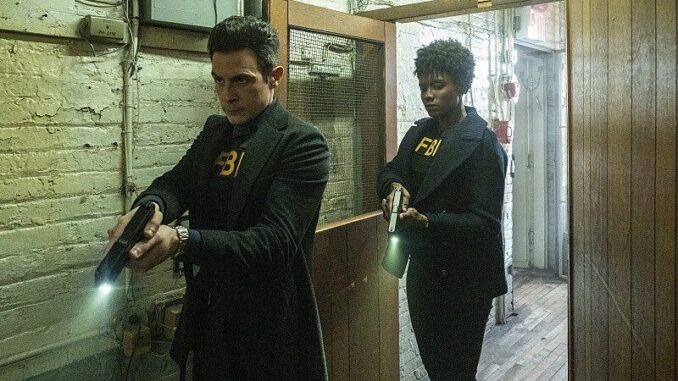
If the Season 8 premiere of FBI was a thunderclap, the episodes that follow form the storm that refuses to let up. From the very first minutes, it’s clear that this season is intent on dismantling certainties — about truth, loyalty, and what it means to serve justice in a divided world. The tagline could easily be “trust no one,” and in Season 8, that warning extends even to the agents themselves.
At its core, this new chapter is less about external threats and more about internal fractures. Maggie Bell and OA Zidan, once the series’ unshakable moral center, find themselves questioning the very institution they’ve dedicated their lives to. The Bureau is no longer presented as an unblemished guardian of order; instead, it’s an organization riddled with bureaucracy, secrecy, and political pressure. That evolution gives FBI a sharper, almost paranoid energy — one that reflects the cultural climate of 2025 as much as it drives the narrative.
The season’s central motif — the collapse of trust — plays out across multiple threads. In one episode, a whistleblower within the Bureau leaks classified files, exposing inconsistencies in old investigations. The fallout forces the team to confront uncomfortable truths: that not every “closed case” was closed for the right reasons. For Maggie, who has built her identity around integrity, this revelation cuts deep. Her scenes this season are quieter but heavier, filled with moments of self-doubt and simmering anger.
OA, meanwhile, faces a different kind of deception — one closer to home. When evidence surfaces linking a former mentor to an illegal surveillance program, OA must decide whether to protect the man who shaped his career or expose him for betraying the badge. The emotional complexity of his arc adds a new dimension to Zeeko Zaki’s performance, grounding the show’s procedural rhythm in personal consequence.
One of the season’s smartest choices is expanding the narrative lens beyond the field team. The writers delve deeper into the political machinery that controls the Bureau. Isobel Castille (Alana de la Garza) emerges as a pivotal figure caught between her agents and the bureaucrats demanding results. Her growing frustration — balancing transparency with the need for secrecy — mirrors the audience’s own distrust of institutions. It’s a storyline that gives FBI renewed resonance, transforming it from a straightforward crime drama into a nuanced examination of moral compromise.
Visually, Season 8 leans into tension. The cinematography uses muted blues and grays, evoking a constant sense of unease. Even the most mundane office scenes feel charged, as if danger lurks just outside the frame. The camera lingers longer on faces — on doubt, hesitation, and the moments before a decision that might change everything. This visual language reinforces the show’s new identity: less about spectacle, more about scrutiny.
By midseason, the narrative threads begin to intertwine. Secrets once buried under classified reports resurface, connecting past and present cases in unexpected ways. The team discovers that a series of domestic terror incidents may have been exacerbated — even manipulated — by someone within the Bureau. The revelation shakes every character’s faith, blurring the line between protector and perpetrator. The FBI of Season 8 is no longer a fortress of certainty; it’s a maze of deception.
Yet amid the chaos, the show retains its humanity. The personal connections — Maggie’s mentorship of a rookie agent, OA’s struggle with isolation, Jubal’s battle to balance empathy with command — remind viewers that beneath the armor of authority, these are people fighting not just criminals, but themselves. That balance between procedural precision and emotional honesty is what keeps FBI compelling after eight seasons.
The season’s tagline — “When the system cracks, who do you trust?” — captures its essence perfectly. Every episode feels like an answer and a challenge to that question. By the finale’s buildup, it’s clear that FBI isn’t content with neat resolutions. Instead, it dares to ask whether justice can survive when truth itself becomes negotiable.
In a landscape filled with formulaic police dramas, FBI Season 8 stands out for its willingness to evolve. It’s not afraid to make its heroes doubt, stumble, and confront the uncomfortable possibility that the real enemy might be the very system they swore to defend. The result is a tense, emotionally charged season that turns the procedural genre inside out — proving that the scariest crimes aren’t always committed by strangers, but by those we once trusted most.